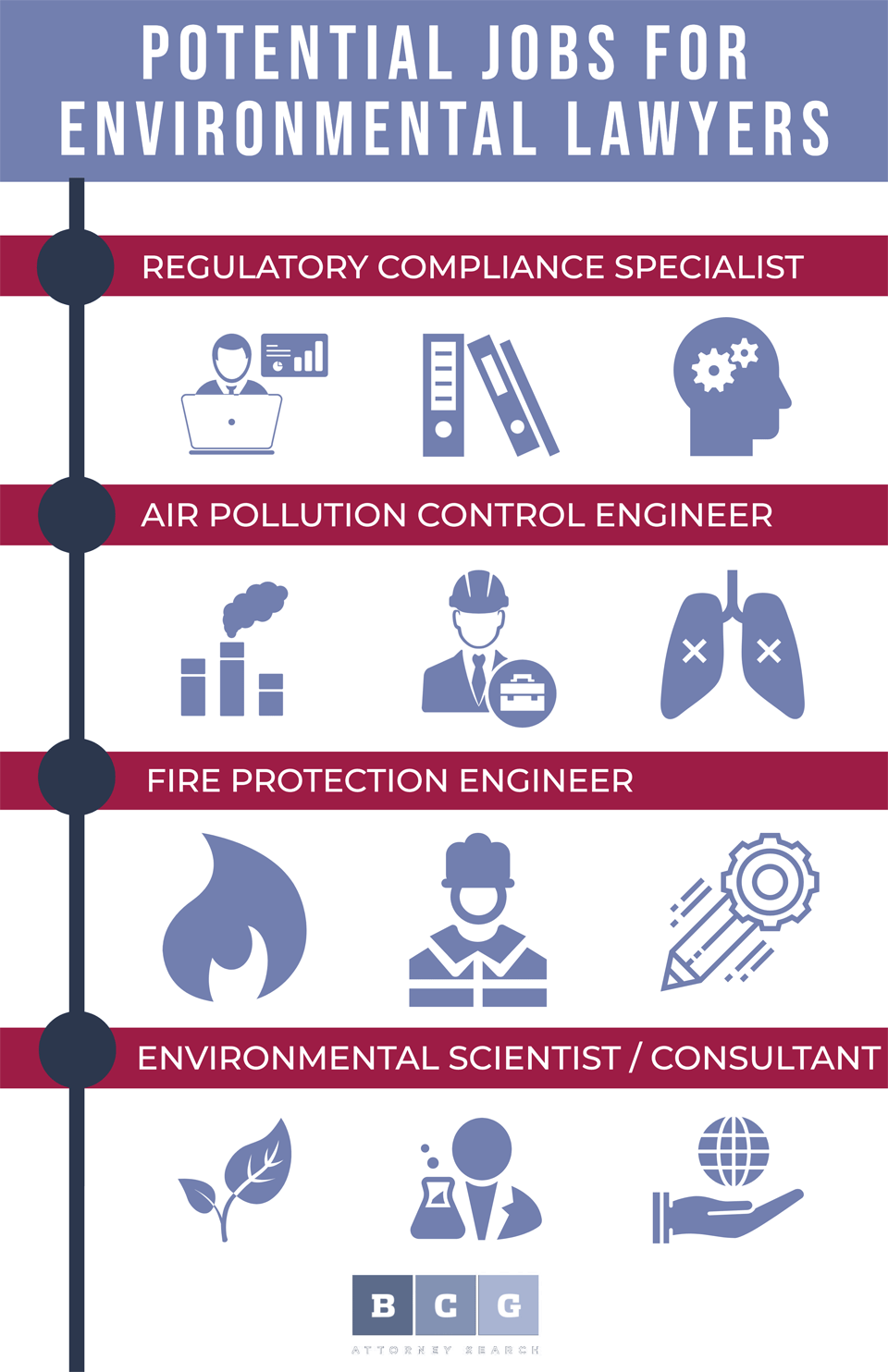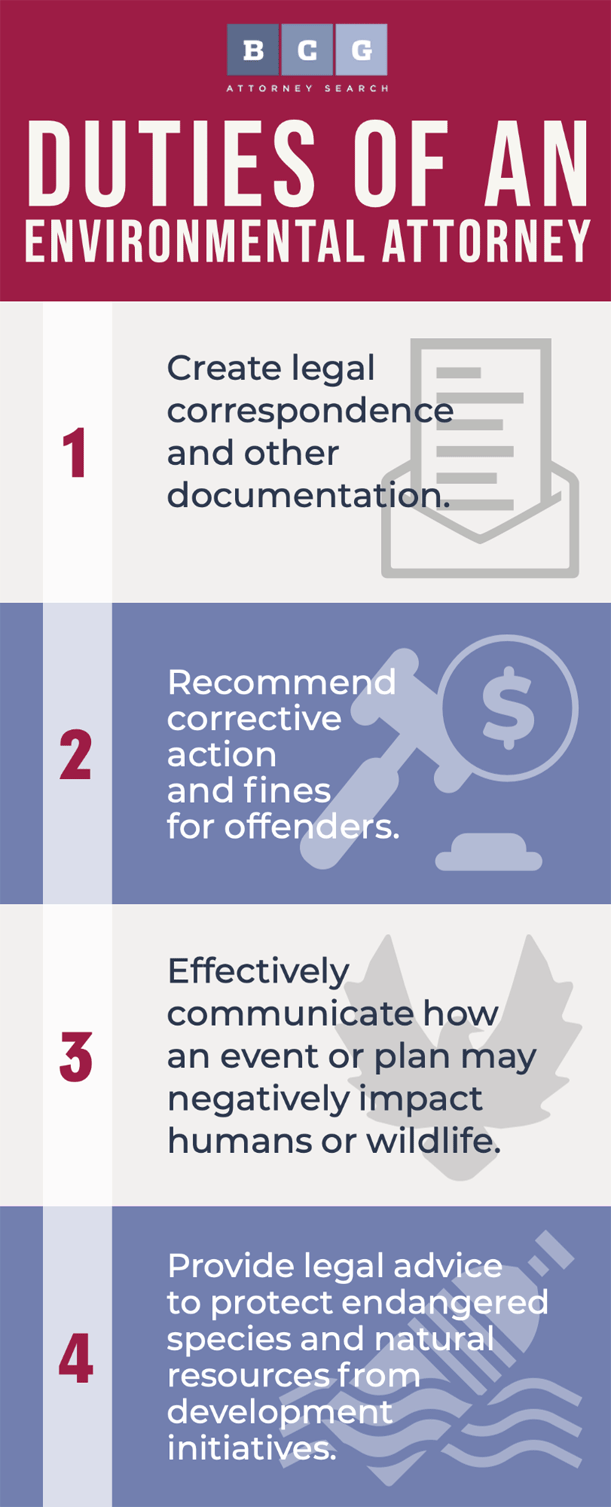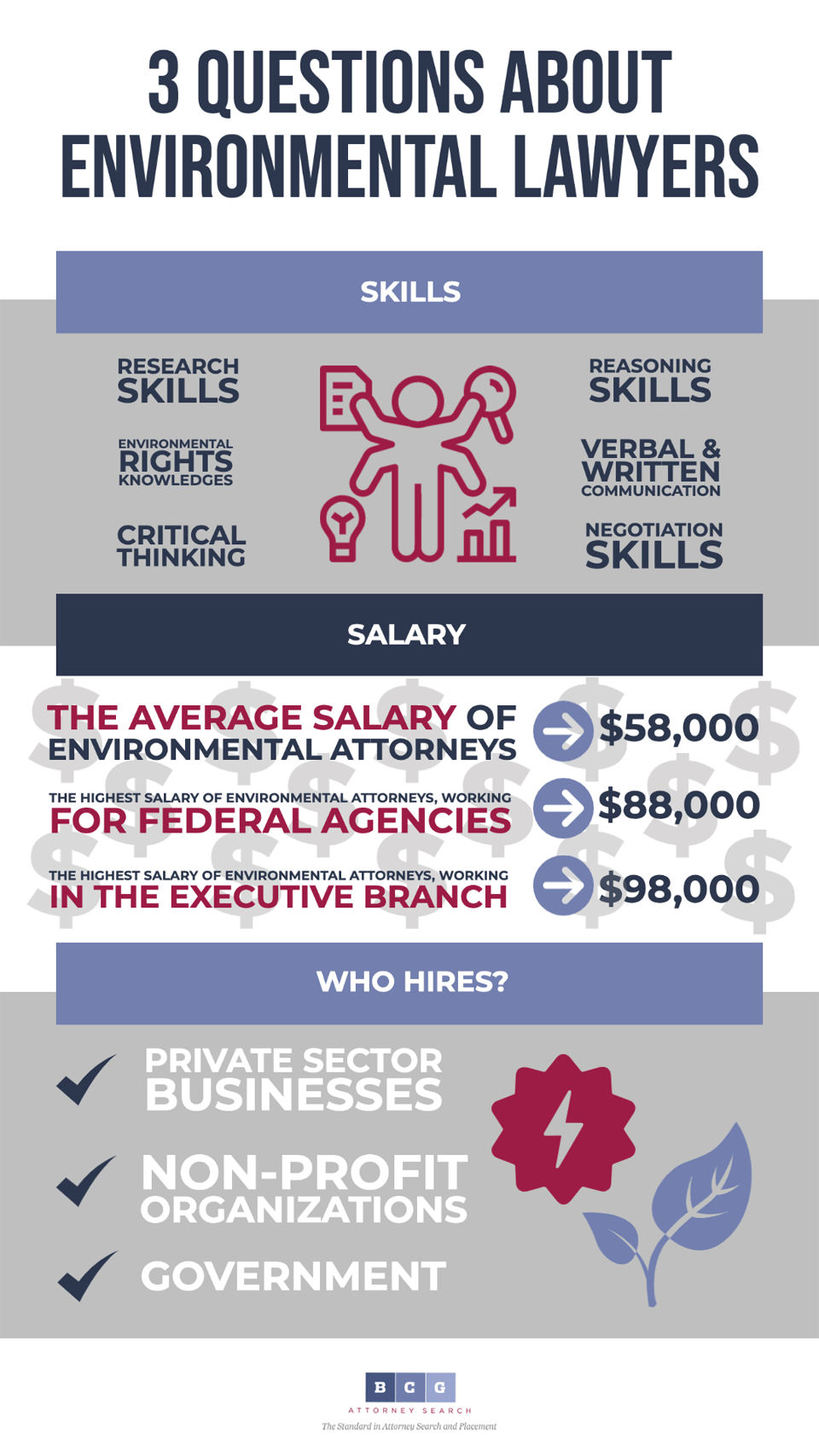An Overview of Environmental Law: Starting a Career in the Field
Are you interested in a career in Environmental Law? Read on to find out what it takes to start one, how much you can expect to earn, and how the field evolves.

Environmental lawyers are becoming more critical than ever before as society becomes more aware of humans' impact on our environment. Environmental law covers many areas, including sustainability, climate change, pollution prevention, and clean-up efforts. This article will protect some information about starting your career in this fascinating field.
What Is Environmental Law and Why Should You Care
One reason you should care about environmental law is that it affects all of us. Humans rely on the natural world for survival. If we want to continue living here in an intact ecosystem with healthy plants & animals, then someone needs must keep watch over what goes into making up their habitats! It's not just humans who need protecting either; other inhabitants like birds spend much time feeding off bugs that live near trees or flowers - so any change at all to the ecosystem could have a knock-on effect that harms those creatures as well.
An environmental lawyer is responsible for understanding the many varied, ever-changing laws and regulations about our environment. They represent a wide range of clients in environmental case law and legislation. Many environmental lawyers enter the field through a love of the outdoors and protecting the natural world in which we live. Environmental lawyers are often required to appear in federal, state, and administrative law court proceedings. They may be representing governmental agencies, citizens' groups, or individual plaintiffs.
It would help if you also cared about this topic because many lawyers and people with legal knowledge are needed to enforce our laws, policies, and regulations. Environmental law has become so complex over time that it requires intelligent & educated people to understand what is going on, how it affects the environment, and what needs doing for things to even out.
The Job of Environmental Lawyers

Choosing a career as an environmental lawyer means that you are choosing a job where no two days will ever be alike. There are many different types of jobs available in this field, including:
- Regulatory Compliance Specialist
- Air Pollution Control Engineer
- Fire Protection Engineer
- Environmental Scientist / Consultant
There are no jobs available for those with these backgrounds, showing how environmental law is a growing area of interest in the legal industry. There are also jobs available for lawyers who wish to work in private practice, doing things like helping companies with their compliance issues or even working on the other side where they would act as an attorney for a corporation being sued.
Many environmental lawyers ensure that corporations follow EPA regulations. The EPA website provides information about environmental acts like the Clean Air Act and the Resource Conservation and Recovery Act.
Duties of an Environmental Attorney
- Create legal correspondence and other documentation
- Recommend corrective action and fines for offenders
- Effectively communicate how an event or plan may negatively impact humans or wildlife
- Provide legal advice to protect endangered species and natural resources from development initiatives that would cause harm or destruction of habitats for these animals
- Provide counsel to clients
- Determine if there is enough evidence to represent a business, individual, or government agency
- Assess damages and impact from an event Interview clients and other people of interest to compile evidence to develop a case
- Effectively and persuasively present evidence and other findings at trial

How to Start a Career in Environmental Law
To get a job in environmental law, you need extensive knowledge and experience. In addition, certain types of positions require that the person has gone through school programs or internships with an organization that deals exclusively on these matters--such as The Natural Resources Defense Council (NRDC).
Environmental law encompasses a broad area of legal issues, rules, and regulations regarding the environment. These include, but are not limited to, air quality, water quality, protection of species, hazardous waste, wetlands, agriculture, waste management, biodiversity, sustainability strategies, alternative energy sources, and green initiatives. Environmental lawyers are called upon to handle these issues and advise clients on sustainability, green standards, climate change, global warming, and the environment.
Second-career attorneys with science or engineering degrees, particularly prior experience in the environmental field, may find practicing environmental law rewarding because they can use their scientific expertise and practical implementation experience.

Educational Requirements for Environmental Laws
Aspiring environmental lawyers should consider how the degree will help them to become better at their jobs. Most work in environmental law requires at least a bachelor's degree, though some jobs may require further education. A Master of Laws (LLM) is needed for many of the most prominent positions within this field, including those specializing in Environmental Law or Sustainable Development. This advanced degree will prepare you to practice law as an attorney and consult some of the most complicated environmental cases.
The undergraduate degrees in environmental laws are perfect for those looking to work on important, complex issues that affect our society. A bachelor's degree is required to be admitted into law school. There isn't a specific program of study required; however, law students may consider seeking an undergraduate degree in environmental policy, environmental science, environmental justice, business management, or government. Programs about these subjects may help students as they apply to the best environmental law schools. A law school admission test, such as the LSAT, is required for entry into law school. Passing the bar exam is required to practice law as an attorney.
There are other options available for education for those unable to attend law school, including online programs or attending a community college first and then transferring credits over onto your bachelor's program before applying for an advanced degree in environmental law. Online courses allow you access to the same materials and educational resources you would receive on campus, including classroom time with your professor.
Many ecological law schools offer internships and other work experience opportunities for students, so you'll have a chance to get hands-on experience in this field before even graduating. It can help set you apart when applying for jobs after graduation.
High school students interested in environmental laws should consider taking sciences courses like biology and chemistry, and math. These will help you to get a strong start on your undergraduate studies.
The NRDC is the nation's most effective environmental action organization - not only do they work to educate people about how they can help maintain a clean & healthy environment and provide opportunities for those who wish to become involved in their efforts. In addition, they offer a summer fellowship program for those who want to work with them and gain experience.
The American Bar Association (ABA) provides a listing of certificate programs if you are interested in choosing a law school that offers certification in environmental law.
Getting Experience in Environmental Law
One way to get experience is to work as a volunteer. You can do this through your law school or other professional organizations that focus on this area of law, such as the NRDC, where lawyers and scientists provide pro bono legal services for those who cannot afford them.
Another way to get experience in environmental practice is to take an internship at a respected organization involved in these areas. It could be an office environment In private firms. It will give you the practical expertise lacking from your school program and show prospective employers what you're capable of doing.
Finally, one way to get experience in ecological law is by working with a lawyer or in-house counsel with extensive knowledge and contacts within this field (and may even offer you a permanent position after completing your internship).
Skills Required to Prepare Students for Environmental Law Career
In addition to a solid educational background, a successful environmental lawyer will need to have many skills, including research, analysis, negotiation, and written and verbal communication. To deal with the public and other organizations involved in your cases or projects, you need exceptional people skills that will help you get along well with everyone. You also need to have critical thinking and reasoning skills, as you will be required to determine why this case is essential and how it impacts the environment. Aspiring lawyers must have a passion for their career, such as knowing environmental rights, facilitating green initiatives, and tackling global warming.
Environmental Lawyer Salary
The median salary of environmental attorneys (and these are people who have already spent years working in this field) is around $62,000. It means that if you are starting fresh with your law degree, it could be a long time before you can expect to see anything near what the average lawyer makes. However, there are some benefits of choosing ecological law over other legal specialties, including better job security and higher pay for those who work in law firms.
According to the Bureau of Labor Statistics, the average salary of environmentalists is $58,000.
Environmental lawyers working for a local government make an average of $60,000 per year. In contrast, those working in state government entities can expect to earn slightly more with an annual income averaging around $64,000. Lawyers who work for federal agencies are among the highest earners at about $88,000, while lawyers in the executive branch earn an average of $98,000.
How to Get a Career in Environmental Law
If you are interested in environmental issues and the environment itself, this field might be right up your alley. When looking for environmental lawyer jobs, look for organizations and firms that lobby for strong policies for renewable energy, storage, and transmission.
Environmental lawyers work in government, non-profit organizations, within the private sector for businesses, or public interest lawyers.
Who Hires Environmental Lawyers?
Most environmental lawyers work in law firms or for government agencies. More and more people are becoming concerned with the environment, so there is a growing need for those who wish to be part of this field.
An environmental attorney working for the government may help defend public land. When corporations or individuals cause mass pollution or other environmental harm, environmental lawyers represent the prosecution. The Environmental Protection Agency (EPA) often hires these individuals. Many private practices specialize in environmental law or hire several lawyers to specialize in it. Environmental lawyers can also start their training.
Environmental Lawyer Job Search & Job Description
The legal job description of an environmental lawyer includes both regulatory practice and litigation work. Job duties and skills required for environmental lawyers are broad and may include:
- Drafting legislation for environmental law
- Lobbying elected officials in legal avenues
- Advising environmental policymakers at all levels of government
- Designing new featured or trusted partner programs and all school search, finder, or match results.
- Environmental regulations and compliance
- Scientific testing and interpretation
- Public speaking / public education
- Environmental impact assessment, research, and analysis for current or proposed policies.
Other Types of Law You Might Be Interested In
- Natural Resource Law
- Oil and Gas Law
- Water Law
Resources for Job Seekers & Law Students
For more information on what it takes to get a job in environmental law or how much money you can expect to make, check out the resources below:
About Harrison Barnes
No legal recruiter in the United States has placed more attorneys at top law firms across every practice area than Harrison Barnes. His unmatched expertise, industry connections, and proven placement strategies have made him the most influential legal career advisor for attorneys seeking success in Big Law, elite boutiques, mid-sized firms, small firms, firms in the largest and smallest markets, and in over 350 separate practice areas.
A Reach Unlike Any Other Legal Recruiter
Most legal recruiters focus only on placing attorneys in large markets or specific practice areas, but Harrison places attorneys at all levels, in all practice areas, and in all locations-from the most prestigious firms in New York, Los Angeles, and Washington, D.C., to small and mid-sized firms in rural markets. Every week, he successfully places attorneys not only in high-demand practice areas like corporate and litigation but also in niche and less commonly recruited areas such as:
- Immigration Law
- Workers Compensation
- Insurance
- Family Law
- Trust and Estate
- Municipal law
- And many more...
This breadth of placements is unheard of in the legal recruiting industry and is a testament to his extraordinary ability to connect attorneys with the right firms, regardless of market size or practice area.
Proven Success at All Levels
With over 25 years of experience, Harrison has successfully placed attorneys at over 1,000 law firms, including:
- Top Am Law 100 firms such including Sullivan and Cromwell, and almost every AmLaw 100 and AmLaw 200 law firm.
- Elite boutique firms with specialized practices
- Mid-sized firms looking to expand their practice areas
- Growing firms in small and rural markets
He has also placed hundreds of law firm partners and has worked on firm and practice area mergers, helping law firms strategically grow their teams.
Unmatched Commitment to Attorney Success - The Story of BCG Attorney Search
Harrison Barnes is not just the most effective legal recruiter in the country, he is also the founder of BCG Attorney Search, a recruiting powerhouse that has helped thousands of attorneys transform their careers. His vision for BCG goes beyond just job placement; it is built on a mission to provide attorneys with opportunities they would never have access to otherwise. Unlike traditional recruiting firms, BCG Attorney Search operates as a career partner, not just a placement service. The firm's unparalleled resources, including a team of over 150 employees, enable it to offer customized job searches, direct outreach to firms, and market intelligence that no other legal recruiting service provides. Attorneys working with Harrison and BCG gain access to hidden opportunities, real-time insights on firm hiring trends, and guidance from a team that truly understands the legal market. You can read more about how BCG Attorney Search revolutionizes legal recruiting here: The Story of BCG Attorney Search and What We Do for You.
The Most Trusted Career Advisor for Attorneys
Harrison's legal career insights are the most widely followed in the profession.
- His articles on BCG Search alone are read by over 150,000 attorneys per month, making his guidance the most sought-after in the legal field. Read his latest insights here.
- He has conducted hundreds of hours of career development webinars, available here: Harrison Barnes Webinar Replays.
- His placement success is unmatched-see examples here: Harrison Barnes' Attorney Placements.
- He has created numerous comprehensive career development courses, including BigLaw Breakthrough, designed to help attorneys land positions at elite law firms.
Submit Your Resume to Work with Harrison Barnes
If you are serious about advancing your legal career and want access to the most sought-after law firm opportunities, Harrison Barnes is the most powerful recruiter to have on your side.
Submit your resume today to start working with him: Submit Resume Here
With an unmatched track record of success, a vast team of over 150 dedicated employees, and a reach into every market and practice area, Harrison Barnes is the recruiter who makes career transformations happen and has the talent and resources behind him to make this happen.
A Relentless Commitment to Attorney Success
Unlike most recruiters who work with only a narrow subset of attorneys, Harrison Barnes works with lawyers at all stages of their careers, from junior associates to senior partners, in every practice area imaginable. His placements are not limited to only those with "elite" credentials-he has helped thousands of attorneys, including those who thought it was impossible to move firms, find their next great opportunity.
Harrison's work is backed by a team of over 150 professionals who work around the clock to uncover hidden job opportunities at law firms across the country. His team:
- Finds and creates job openings that aren't publicly listed, giving attorneys access to exclusive opportunities.
- Works closely with candidates to ensure their resumes and applications stand out.
- Provides ongoing guidance and career coaching to help attorneys navigate interviews, negotiations, and transitions successfully.
This level of dedicated support is unmatched in the legal recruiting industry.
A Legal Recruiter Who Changes Lives
Harrison believes that every attorney-no matter their background, law school, or previous experience-has the potential to find success in the right law firm environment. Many attorneys come to him feeling stuck in their careers, underpaid, or unsure of their next steps. Through his unique ability to identify the right opportunities, he helps attorneys transform their careers in ways they never thought possible.
He has worked with:
- Attorneys making below-market salaries who went on to double or triple their earnings at new firms.
- Senior attorneys who believed they were "too experienced" to make a move and found better roles with firms eager for their expertise.
- Attorneys in small or remote markets who assumed they had no options-only to be placed at strong firms they never knew existed.
- Partners looking for a better platform or more autonomy who successfully transitioned to firms where they could grow their practice.
For attorneys who think their options are limited, Harrison Barnes has proven time and time again that opportunities exist-often in places they never expected.
Submit Your Resume Today - Start Your Career Transformation
If you want to explore new career opportunities, Harrison Barnes and BCG Attorney Search are your best resources. Whether you are looking for a BigLaw position, a boutique firm, or a move to a better work environment, Harrison's expertise will help you take control of your future.
Submit Your Resume Here to get started with Harrison Barnes today.
Harrison's reach, experience, and proven results make him the best legal recruiter in the industry. Don't settle for an average recruiter-work with the one who has changed the careers of thousands of attorneys and can do the same for you.
About BCG Attorney Search
BCG Attorney Search matches attorneys and law firms with unparalleled expertise and drive, while achieving results. Known globally for its success in locating and placing attorneys in law firms of all sizes, BCG Attorney Search has placed thousands of attorneys in law firms in thousands of different law firms around the country. Unlike other legal placement firms, BCG Attorney Search brings massive resources of over 150 employees to its placement efforts locating positions and opportunities its competitors simply cannot. Every legal recruiter at BCG Attorney Search is a former successful attorney who attended a top law school, worked in top law firms and brought massive drive and commitment to their work. BCG Attorney Search legal recruiters take your legal career seriously and understand attorneys. For more information, please visit www.BCGSearch.com.
Harrison Barnes does a weekly free webinar with live Q&A for attorneys and law students each Wednesday at 10:00 am PST. You can attend anonymously and ask questions about your career, this article, or any other legal career-related topics. You can sign up for the weekly webinar here: Register on Zoom
Harrison also does a weekly free webinar with live Q&A for law firms, companies, and others who hire attorneys each Wednesday at 10:00 am PST. You can sign up for the weekly webinar here: Register on Zoom
You can browse a list of past webinars here: Webinar Replays
You can also listen to Harrison Barnes Podcasts here: Attorney Career Advice Podcasts
You can also read Harrison Barnes' articles and books here: Harrison's Perspectives
Harrison Barnes is the legal profession's mentor and may be the only person in your legal career who will tell you why you are not reaching your full potential and what you really need to do to grow as an attorney--regardless of how much it hurts. If you prefer truth to stagnation, growth to comfort, and actionable ideas instead of fluffy concepts, you and Harrison will get along just fine. If, however, you want to stay where you are, talk about your past successes, and feel comfortable, Harrison is not for you.
Truly great mentors are like parents, doctors, therapists, spiritual figures, and others because in order to help you they need to expose you to pain and expose your weaknesses. But suppose you act on the advice and pain created by a mentor. In that case, you will become better: a better attorney, better employees, a better boss, know where you are going, and appreciate where you have been--you will hopefully also become a happier and better person. As you learn from Harrison, he hopes he will become your mentor.
To read more career and life advice articles visit Harrison's personal blog.





